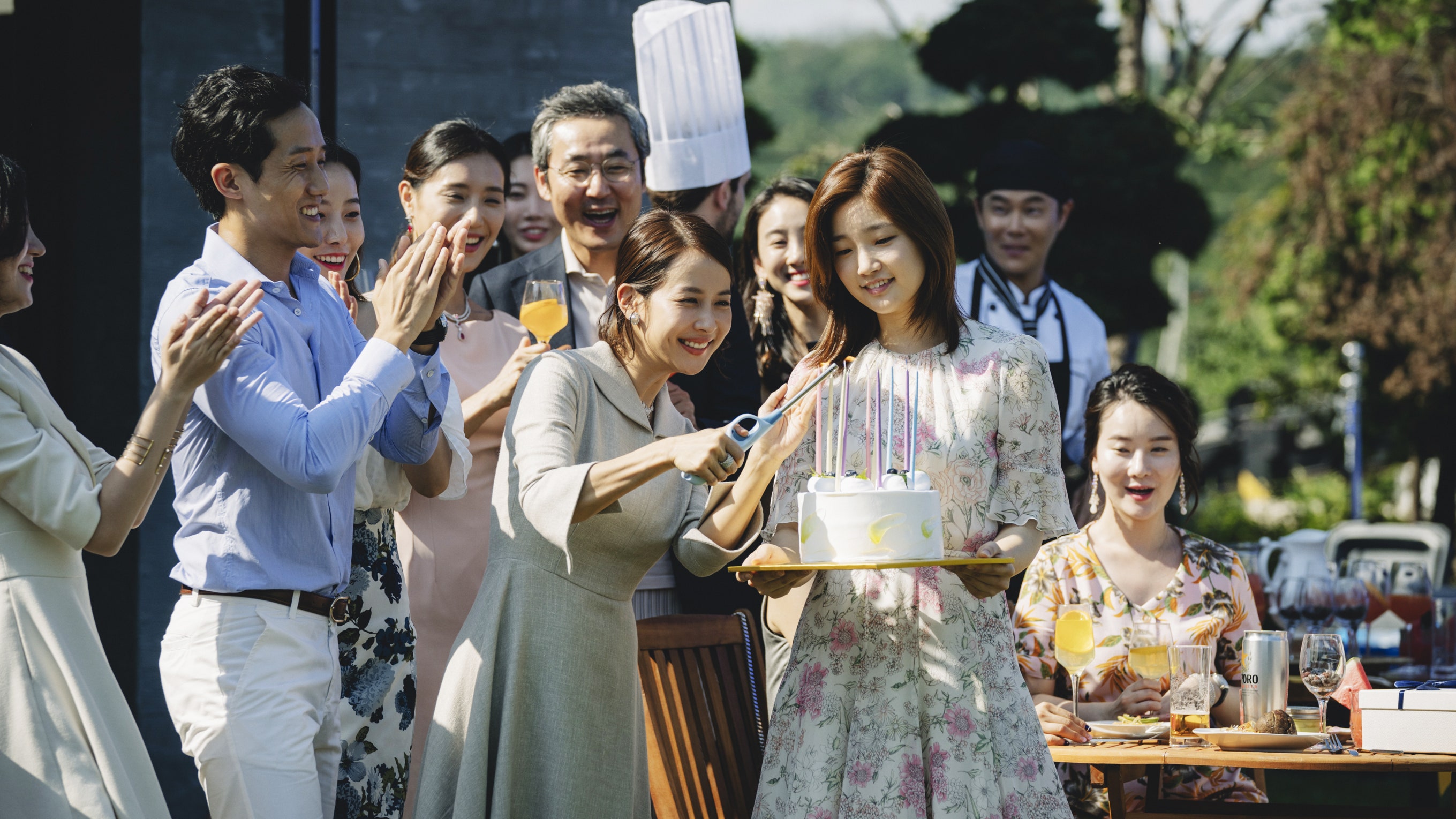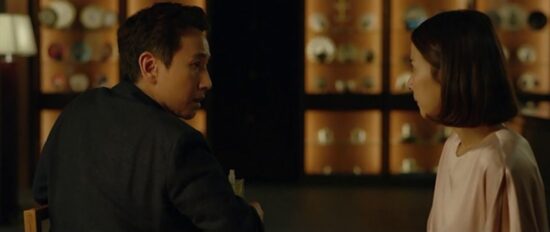
The impoverished Kim family – father Ki-taek (Song Kang-ho), mother Chung-sook (Jang Hye-jin), daughter Ki-jung (Park So-dam) and son Ki-woo (Choi Woo-shik) – infiltrate one by one the household of the wealthy Parks. The Parks – father Dong-ik (Lee Sun-kyun), mother Yeon-gyo (Cho Yeo-jeong), daughter Da-hye (Jung Ji-so) and son Da-song (Jung Hyeon-jun) – are the opposite of the Kims in Bong Joon-ho’s satirical film Parasite (Gisaengchung, South Korea, 2019), which plays with social and visual dichotomies such as rich and poor, above and below. At first glance, the Parks represent the perfect family – a young, good-looking and successful couple with two children who all live in a beautiful house. Photographs of the family and the couple’s wedding, of the certificate for an award Mr. Park received and the copy of an article on this successful businessman in an English-language magazine adorn a wall in their living room. This outward display of success and happiness looks like the replacement of the traditional family altar by the values of capitalism. However, the film reveals from its very beginning the many cracks in the polished façade of this happy family.
Da-hye needs private lessons in English, but she longs for love and someone who understands her. She is jealous of her little brother, who receives all their parents’ attention. Their mother thinks that Da-song is hyperactive and explains the boy’s eccentric behaviour as the result of a traumatic experience. Mrs. Park is a beautiful woman living a life of leisure in their huge mansion, where the household is run by the housekeeper Moon-gwang (Lee Jung-eun). Mrs. Park’s extravagant lifestyle and her desire for a perfect family leads to hysteria. Her admiration for her young son’s paintings – one of them hangs on the wall in the living room mentioned above – is given exaggerated expression when she compares them to those of the American artist Jean-Michel Basquiat.
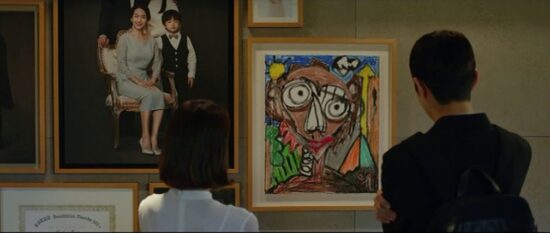
As well as having a strong desire for harmony and the respect of social order, Mrs. Park is also obsessed with hygiene. She only reluctantly shakes hands with Kim Ki-taek, the Parks’ new chauffeur, and she puts on rubber gloves before touching the panties her husband finds under the seat of Mr. Kim’s predecessor, eyeing them as if they are a repulsive insect. She thereby becomes an easy target for Ki-taek, who persuades her that Moon-gwang suffers from active tuberculosis. The housekeeper is promptly fired by Mrs. Park, for whom the disease represents a threat to her desire for cleanliness and order.
Mr. Park speaks of his wife with slight contempt, saying that she is a bad cook and that without help, the house would very quickly look a mess. However, the beautiful and elegant Yeon-gyo is the kind of wife a successful businessman like Park needs – someone he can display like a trophy. He answers Ki-taek’s question about whether he loves his wife evasively and with a mocking smile: “Yes, I love her. Whatever love means.” However, the couple’s sex life is full of hidden desires, with Park stimulated by his wife wearing the panties he found in his car and by imagining that his young ex-chauffeur used to have sex on the back seat – the seat where he sits. Respectability is a mere façade.
Both Mr. Park and Mrs. Park treat their household servants as if they were their personal possessions, and they have no scruples about firing them, although Park does offer Kim extra payment for his services at Da-song’s birthday party. In their huge mansion, the Parks live as if in a cocoon, – insulated from outside reality and in particular from the harsh reality experienced by the Kim family in their basement. The Parks show no concern for those facing unemployment and poverty, and Mrs. Park is simply unaware of the flooding that makes many people homeless, including the Kims. On the morning after the heavy rainfall that caused the flooding, she admires the bright blue sky and is happy that the rain has cleared the air.
Mr. and Mrs. Park are blinded by their lifestyle, oblivious even of the existence of the bunker under their house, and of the presence of the Kim family hiding under the couch on which they make love. Parasite repeatedly insists on the invisibility of the poor, whose lives and desires go unnoticed by the upper class as represented by the Park family. This is expressed with considerable irony by the fact that the Parks are unaware that Moon-gwang’s husband Geun-sae (Park Myung-hoon) has been living secretly in the bunker under their mansion for more than four years. However, one thing that Mr. Park definitely notices and is disgusted by is the stench emanating from his new chauffeur’s body – the stale smell of the basement in which the Kims live and which clings to them. Mr. Park finds the smell offensive, and it reminds him of the smell in the underground railway system and the world of the underclass from which he is kept at a safe distance in his luxury car.
Mr. Park insists on the importance of boundaries, expecting his employees to respect them. He says of Kim: “He will never transgress boundaries. But he did it with his smell.” Mr. Park’s self-centred attitude leads to disaster for him when he shows absolutely no concern for Ki-jung, mortally wounded and covered in blood. Focusing instead on his son, who has lost consciousness, he tries to grab the car keys under the body of the dead Geun-sae, holding his nose in disgust at the man’s smell. This gesture provokes Ki-taek to kill his boss.
Social differences and the Park’s egomania are to a considerable extent symbolized by the setting. The Parks’ estate plays a key role in Parasite. Their mansion looks as if the architect who planned it and lived in it was even more of an egomaniac than its present inhabitants. The building itself and its extensive garden are surrounded by a concrete wall, which makes it reminiscent of a fortress. And as in a fortress, its inhabitants are protected from the outside world and its problems. The spacious building is made even larger optically by its near emptiness. General shots of the interior create the feeling of a stage in a theatre. In the huge and sparsely furnished rooms, the characters are reduced to mere miniature figures.
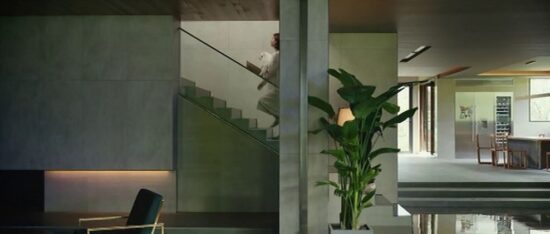
Built of concrete, wood and glass and characterized by clear delineation in its design, the Parks’ house contrasts sharply with the cramped, run-down basement in which the Kim family live and the narrow streets in their part of Seoul. A similar contrast is created by the editing – the shot of Mrs. Park in her vast walk-in wardrobe is followed by a shot of the temporary accommodation in which the Kim family find shelter after their home is flooded and where people rummage in heaps of clothing. The soundtrack supports and heightens the difference between these two locations: the silence in the shot showing Mrs. Park walking about nonchalantly in her wardrobe – her only concern being her son’s birthday party – and the cacophony in the crowded emergency shelter.
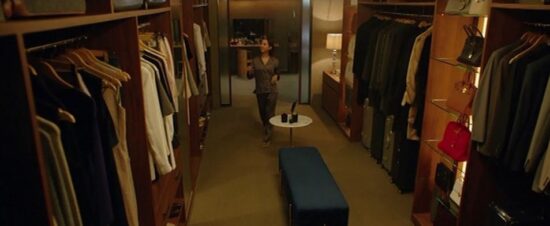
However, the elegant but lifeless residence of the Parks is by no means paradise and is as much a fake as the false identities the members of the Kim family assume so that they can work for the Parks, or as the Parks’ own self-image as the ideal family. By the end of the film, the Parks’ idealized world is engulfed by violence and chaos.
